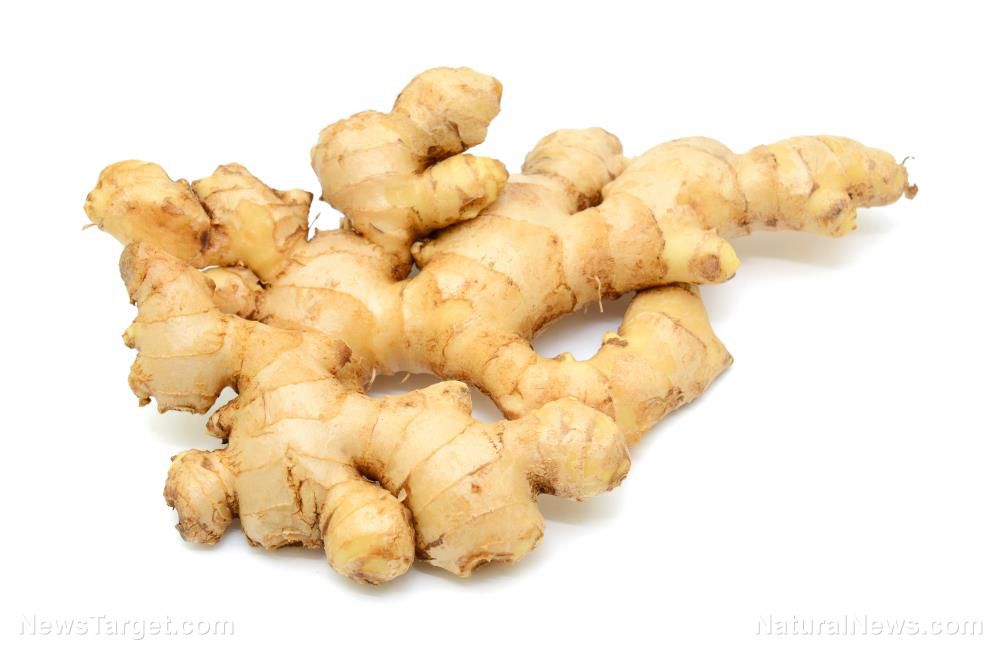The science behind the healing effects of ginger
09/06/2018 / By RJ Jhonson

Ginger is one of those plants widely known to have health benefits but is somehow not recognized by conventional medicine. It has been used by different cultures for centuries, not just as a spice, but also as a medicinal treatment for a variety of conditions. And modern science agrees, as proven by a large number of studies compiled by GreenMedInfo.com, on the health conditions that ginger can help remedy.
The edible part of ginger is a portion of the root called a rhizome. It has a distinct flavor and scent and can be enjoyed as it is, brewed as tea, dried and powdered, or even candied. It is rich in various phytochemicals that make it an effective home remedy, as well as a natural treatment for a variety of conditions.
Nausea
Some recommend ginger for nausea; advice which research has found to have merit. A controlled trial compared the effects of ginger and that of a placebo on seasick naval cadets. The researchers found that those who took ginger reported fewer symptoms of seasickness, including vomiting and nausea.
A combination of protein and ginger was also found to have beneficial effects on cancer patients who are experiencing nausea post-chemotherapy, as well as pregnant women. The authors of the study attributed this not just to ginger’s natural anti-nausea properties, but also to its ability to reduce gastric dysrhythmia.
Muscle soreness
Those who like to exercise will find ginger to be a wonderful plant indeed, what with its ability to soothe delayed onset muscle soreness resulting from unaccustomed activity or eccentric exercise. This is attributed to ginger’s ability to prevent inflammation, as well as its analgesic properties. Taking ginger also helped improve the range of motion of the affected muscles. The study used capsules containing dried ginger.
Mother Nature's micronutrient secret: Organic Broccoli Sprout Capsules now available, delivering 280mg of high-density nutrition, including the extraordinary "sulforaphane" and "glucosinolate" nutrients found only in cruciferous healing foods. Every lot laboratory tested. See availability here.
Heart disease
There are many factors contributing to the risk for heart disease and ginger helps address many of them. For instance, one study has shown its benefits against high cholesterol levels, a common cause of atherosclerosis and heart attack. A double-blind controlled clinical trial determined that ginger has potent lipid-lowering abilities, causing higher reductions in triglyceride and cholesterol levels than the placebo.
A separate study found that ginger can lower blood pressure by blocking voltage-dependent calcium channels. This makes ginger an effective remedy for hypertension, a condition that damages not just the heart, but also the kidneys.
Obesity
Going beyond one’s recommended weight increases the risk for many diseases, including diabetes and heart conditions. Ginger has been found to increase the thermic effects of food, resulting in a feeling of fullness and discouraging further food intake. The spice does this without altering metabolic or hormone parameters in the participants. The researchers interpreted these findings as a demonstration of ginger’s ability to aid in effective weight loss.
Cancer
Cancer, in all its forms, is perhaps one of the most feared diseases today. Tests on the effects of ginger on various types of cancer have, so far, shown promising outcomes.
Once such test found that ginger extract could inhibit the growth and proliferation of pancreatic cancer tumors. Moreover, it caused the autotic death – the death of cells as a result of cellular recycling or autophagy – of the cancer cells.
Another study established that gingerol, a compound found in ginger, can help kill breast cancer cells. What makes this even more remarkable is that gingerol did so selectively, which means that it caused little to no damage to normal cells, unlike many conventional cancer treatments today.
Dog diseases
The benefits of ginger aren’t just for humans; they can also be for dogs. One study reported that the intravenous administration of ginger can be an effective treatment against heartworm, a common parasite in dogs.
Learn about the many medicinal uses of ginger at Remedies.news.
Sources include:
CDN.GreenMedInfo.com [PDF]
Tagged Under: anticancer, antinausea, autosis, dog diseases, dog parasites, food as medicine, functional food, gastric dysrhythmia, ginger, heartworm, herbal medicine, home remedies, hypotensive, lipid reduction, motion sickness, muscle pain, pain relief, pet health, plant medicine, research, scientific, seasickness, weight loss




















